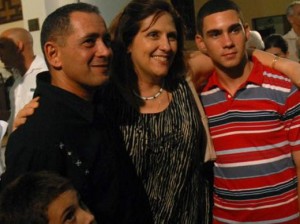
HAVANA, Cuba , September , www.cubanet.org — For some time now we’ve noticed the absence of Elián Gonzalez and other members of his family from the pages of newspapers, radio broadcasts and television channels. We even know the failed attempt by a foreign press correspondent to interview Elián, who is barely seen in his native Cardenas. Anyone would think that this is the normal course of events when people are immersed in the everyday: the little rafter is a school student and cadet, while his father and other family members go about their usual jobs.
However, a recent development suggests that such ostracism could be responding to a policy laid down by the upper echelons of power. Granma newspaper, in its issue of Friday, 23 August, reported that the National Directorate of the Committee for the Defense of the Revolution (CDR) presented its Neighborhood Award — true, the CDRs don’t function at the neighborhood level, but their bosses run around the country holding meeting and handing out distinctions — to the “Museum for the Battle of Ideas,” located in the town of Cardenas in Matanzas. The ceremony was attended by leaders of the Communist Party, of the CDR, the heads of the Museum, and Señora Irma Sehweret, mother of René González, the “Cuban Five” agent released from prison in the United States and repatriated to Cuba. And Granma did not mention anyone else.
If the bombastic “Battle of Ideas” emerged as a result of the hype orchestrated by Cuban authorities around the efforts for Elián’s the return to Cuba, and the creation of the Museum in Cardenas served the purpose of collecting the history those tumultuous times of marches, rallies, Roundtable TV shows, and the discourse of the barricade, how can we conceive that neither Elián, nor his father, nor any other member of the family, were now present at the delivery of that recognition? Clearly, gone are the days when, after Eián returned, and every time a public event was celebrated, the presenters of the “activity” announced the presence of “Elián Gonzalez and his distinguished family.”
Surely, no well-informed observer of the Cuban reality can escape that many of these people converted, the overnight, into “Heroes” by Castro’s propaganda machine, are useful only when they serve to stoke the dispute with United States; an dispute that the Cuban government needs as a safety valve to cover up its mistakes. The show around “The Elián case” did the job while the child was being held in the United States. Then came, from the year 2000, the noise about releasing the five agents accused of espionage, who had been arrested in 1998. In other words, the new droning chorus burst forth when nothing more could be squeezed from the tribulations of rafter.
In this context it is reasonable to expect that the released René González appears in public less often; and that this would equally be the fate of Fernando González Llort, the next agent to be released in February 2014. Perhaps simply to keep the aura of “heroes” of those who face longer sentences, as is the case with Gerardo Hernandez. However, it is also likely that the star of the already expendable is not completely shut down, and that we will be reminded of them from time to time.
So then, did something special happen to Elián and his family, to disappear like that, so totally, from the Castro hoopla? Apparently not even their neighbors in Cardenas are able to offer an adequate response.
About the author
 Orlando Freire. Born Matanzas, 1959. Bachelor in Economics. He has published a book of essays The evidence of our times, winner of the 2005 Vitral Award, and the novel Blood of Freedom, winner of the 2008 Gaveta Franz Kafka Prize. He also won the awards for Ensayo y Cuento in the Universal Dissident Magazine, and the Essay Prize of the magazine Palabra Nueva.
Orlando Freire. Born Matanzas, 1959. Bachelor in Economics. He has published a book of essays The evidence of our times, winner of the 2005 Vitral Award, and the novel Blood of Freedom, winner of the 2008 Gaveta Franz Kafka Prize. He also won the awards for Ensayo y Cuento in the Universal Dissident Magazine, and the Essay Prize of the magazine Palabra Nueva.
From Cubanet
5 September 2013
